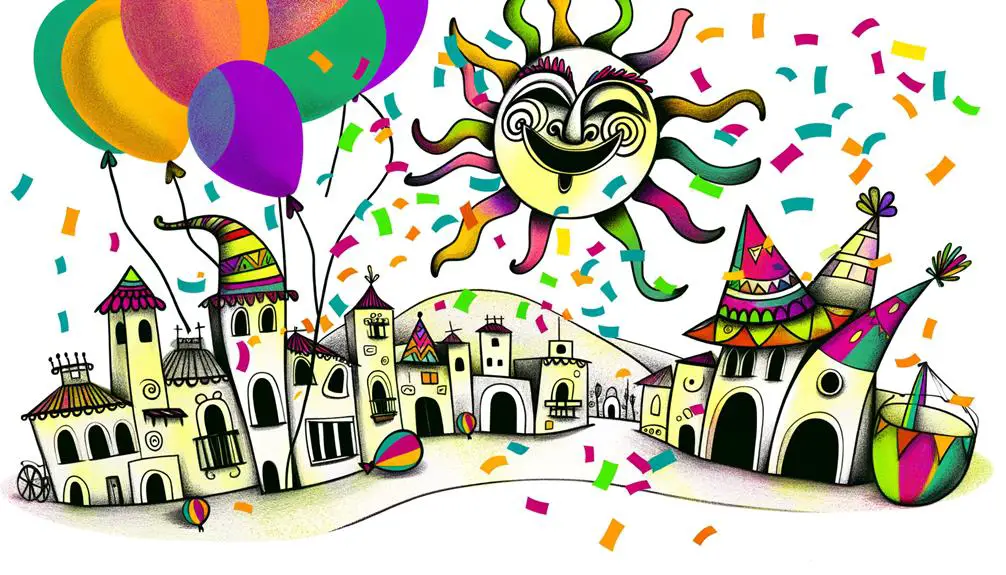When you want to add a playful touch to your Spanish conversations, you can draw from a vibrant array of silly slang expressions. You can use terms like "boludo" or "pelota" to describe goofy friends, or "estar en la luna de Valencia" to convey absurd scenarios. For silly ideas, try "una pamplina" or "un disparate". If you want to describe acting foolish, use "hacer el tonto" or "estar pirado". And for playful insults, use "guapo" or "guapa" sarcastically. As you explore these expressions, you'll discover a world of humor and playfulness that will elevate your Spanish conversations to the next level.
Goofy Ways to Describe Friends
When hanging out with amigos, you've likely heard them described as 'boludo' or 'pelma', which are just two of the many goofy ways to describe friends in Spanish slang. These colloquialisms are a staple of Latin American culture, and they add a touch of humor and playfulness to everyday conversations.
Your loco pals, or quirky buddies, might be referred to as 'chavo' or 'pata', which roughly translate to 'dude' or 'buddy'. In some countries, friends might be affectionately called 'parce' or 'cuate', emphasizing the strong bond between them.
In Spanish slang, friends can be described as 'huevón' or 'vago', implying they're a bit lazy or laid-back. Others might be called 'boludo' or 'pelotudo', which can have a more playful or teasing connotation. These quirky terms of endearment not only add flavor to conversations but also reflect the strong sense of camaraderie and friendship that's deeply rooted in Latin American culture.
Ridiculous Expressions for Crazy Situations
You'll often find yourself in absurd situations where only ridiculous expressions can adequately convey the chaos, like when your amigos describe a crazy scenario as 'estar en la luna de Valencia' or 'ser un cuento chino', which roughly translate to 'being on the moon' or 'being a Chinese tale', implying that the situation is completely absurd or unbelievable.
These expressions are perfect for those loco moments when you need to describe a situation that's just plain crazy.
In these situations, you might need to come up with some crazy excuses to get out of trouble. That's where phrases like 'tomar el pelo' come in, which literally means 'to take someone's hair', but idiomatically means to take someone for a ride or to deceive them.
You might find yourself saying 'me he quedado en el aire' which means 'I've been left hanging in the air', to describe a situation where someone has left you high and dry.
These ridiculous expressions will help you navigate those wild and wacky situations that inevitably arise in life.
Funny Words for Silly Ideas

Spanish slang has a treasure trove of funny words to describe silly ideas, allowing you to label a ridiculous notion as 'una pamplina' or 'un disparate', which roughly translate to 'a bunch of nonsense' or 'a load of rubbish'.
You can also use 'una chorrada' to describe a silly or foolish idea, or 'un disparate mayor' to emphasize the absurdity of the notion.
When you're dealing with loco phrases, you'll find that Spanish slang has plenty of options to describe ridiculous reasons. For instance, you can say 'eso es una tomadura de pelo' to imply that someone's excuse is a joke or a ridiculous reason.
Alternatively, you can use 'eso es una gilipollez' to express that an idea is completely absurd. With these phrases, you'll be well-equipped to describe the ridiculous ideas that come your way.
Spanish Slang for Acting Foolish
From ridiculous ideas to foolish behavior, you're likely to encounter people acting silly, and Spanish slang has got you covered with words that perfectly capture their antics.
When you witness someone's loco behavior, you can describe it as 'hacer el tonto' (acting like a fool) or 'estar pirado' (being crazy). If someone's foolish antics are more playful, you can say they're 'haciendo el payaso' (acting like a clown).
You might also hear the phrase 'estar en la luna de Valencia' (to be in the moon of Valencia), which means someone is acting foolishly or being unrealistic. Another common expression is 'tomar el pelo' (to take someone for a ride), which implies someone is acting silly or playing a prank on someone.
When describing someone's foolish behavior, you can say they're 'perdido en la selva' (lost in the jungle), implying they're completely clueless.
With these phrases, you'll be well-equipped to describe the silly antics of those around you. Spanish slang provides a colorful way to express the absurdity and humor in everyday situations, so you can join in on the fun and poke fun at those around you.
Playful Insults and Teasing Terms

When friends and family engage in playful banter, they often resort to clever insults and teasing terms that are an integral part of Spanish slang. You'll notice that these lighthearted jabs aren't meant to offend, but rather to add humor and playfulness to the conversation.
In Spanish slang, these teasing tricks are used to poke fun at each other in a non-malicious way. For instance, you might call a friend 'guapo' (handsome) or 'guapa' (beautiful) in a sarcastic tone, implying the opposite.
This playful banter is a common aspect of Spanish culture, and it's essential to understand the context and tone to avoid misunderstandings. By using these teasing terms, you can build stronger relationships and show affection in a humorous way.
Frequently Asked Questions
Is Spanish Slang Used Differently in Latin America Versus Spain?
You might come across an interesting coincidence: Spanish slang varies considerably between Latin America and Spain. As you explore further, you'll discover that cultural nuances and dialectal variations are key factors.
In Latin America, indigenous and African influences have shaped slang, while in Spain, Arabic and Mediterranean influences prevail. You'll find that each region has its unique flavor, making Spanish slang a fascinating reflection of cultural heritage.
Can I Use Slang in Formal Writing or Professional Settings?
When considering using slang in formal writing or professional settings, you should be cautious. Slang can blur tone boundaries, making it difficult to maintain a professional tone.
Additionally, using slang can disrupt the language hierarchy, where formal language is expected. You risk compromising your credibility and authority.
To maintain a professional image, it's best to stick with standard language, avoiding slang in formal writing and professional settings.
How Do I Know Which Slang Words Are Offensive or Inappropriate?
When maneuvering through slang in professional settings, you need to be mindful of cultural nuances. To avoid using offensive or inappropriate terms, you should implement slang filters.
Research the etymology and connotations of slang words to make sure you're not unintentionally offending someone. Be aware of your audience and the context in which you're using slang.
Are There Regional Differences in Slang Usage Within Spain?
As you meander through Spain, you're exploring a tapestry of diverse regional flavors. You'll discover that slang usage varies greatly across the country.
In the south, Andalusian dialects unfold like a rich flamenco dance.
In Catalonia, you'll encounter unique variations that reflect the region's distinct identity.
Meanwhile, the Basque region weaves its own idioms, while Galicia spins its own linguistic magic.
Even Madrid has its own colloquialisms that set it apart.
You'll need to tune in to each region's rhythm to truly understand its slang.
Can Non-Native Speakers Use Slang Without Sounding Pretentious?
To successfully navigate the use of slang, you must walk a fine line between authenticity and cultural appropriation. As a non-native speaker, you need to be mindful of language ownership and avoid pretending to be something you're not.
Understanding the context and nuances of the slang you're using, rather than simply mimicking native speakers, is crucial.







